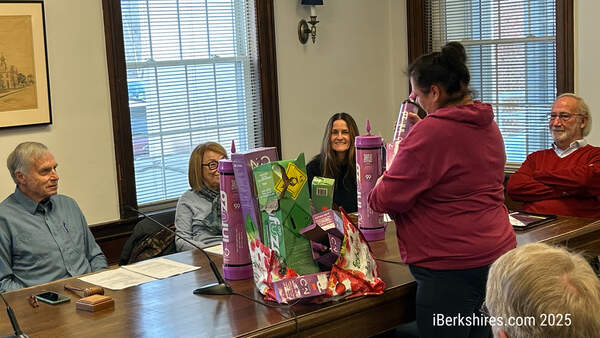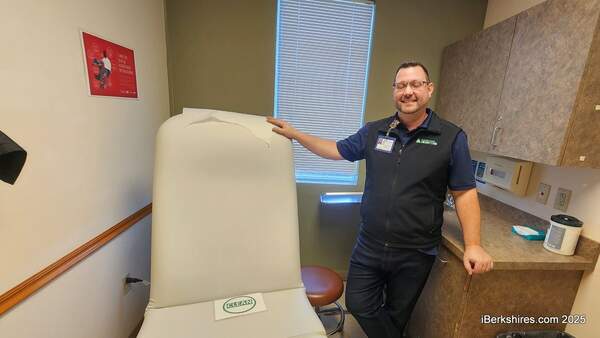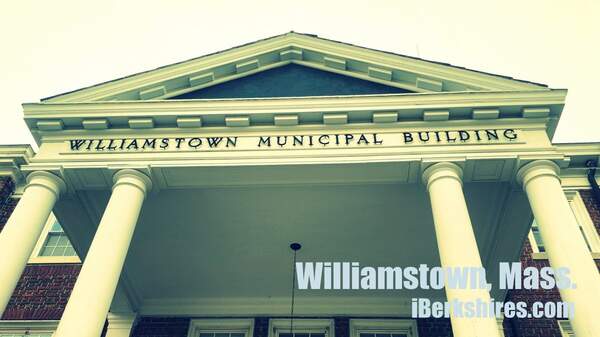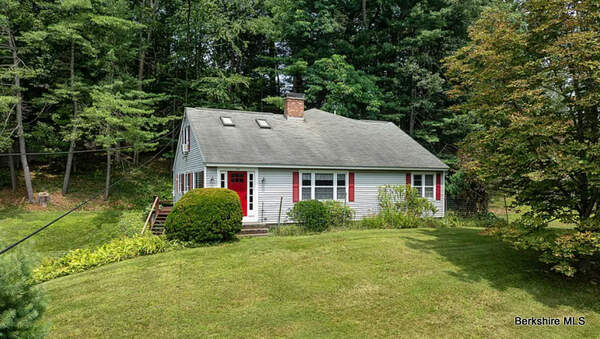Williamstown Housing Trust Asked to Help With Cable Mills Bond
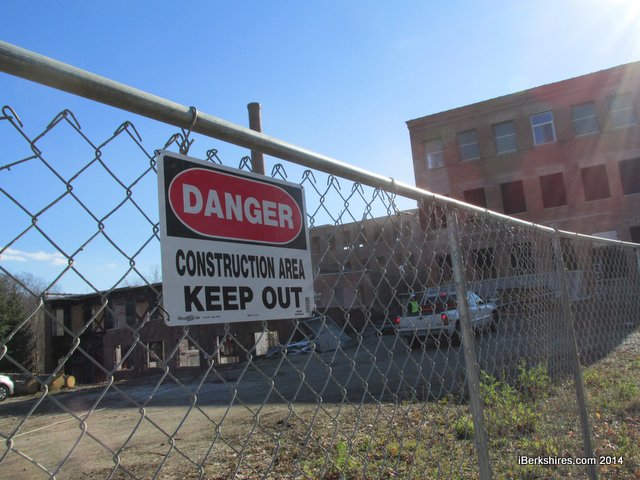 The Community Preservation Committee is asking to borrow back $200,000 awarded to the Affordable Housing Trust to help meet its obligations to the Cable Mills project that finally began construction. The Community Preservation Committee is asking to borrow back $200,000 awarded to the Affordable Housing Trust to help meet its obligations to the Cable Mills project that finally began construction. |
WILLIAMSTOWN, Mass. — Two members of the Community Preservation Committee have asked the Affordable Housing Trust to consider returning some money — at least temporarily.
Philip McKnight and Jeffrey Thomas last Tuesday asked the board of the trust to help reduce the debt the town will need to incur to meet its obligation to the Cable Mills renovation project.
Back in 2007, the town committed about $1.5 million in current or future Community Preservation Act funds toward what is now estimated to be a $27 million project to rehabilitate the Water Street mill complex and create residential apartments.
The CPC already has paid off some of that debt, but will need to take out a bond for the remaining $1.1 million this spring to pay the developer now that work has begun on the long-delayed project.
McKnight and Thomas told the trust that the CPC plans to take a couple of steps to reduce the size of the bond and the interest payment the town will face on a 10-year note. First, the CPC plans to "piggyback" its bond on a planned rebond of debt at the elementary school; the larger the bond, the better the interest rate.
Second, the CPC plans to allocate about $200,000 of this year's Community Preservation Act revenues (projected to be about $400,000) toward the principal, lowering the amount that needs to be borrowed.
Third — a move so far only pitched by Thomas and McKnight and not considered by the entire committee — would be taking back some of the CPA money that has seeded the town's Affordable Housing Trust.
Their pitch was threefold: One, reducing the bond size will put the CPC in a better position to fund town projects (including affordable housing) over the next 10 years. Two, reducing the size of the principal will save the town interest payments. Third, Cable Mills when completed will add 13 units of subsidized housing to the town's stock.
That is part of the reason why CPA money was promised to the Cable Mills project in the first place. The plan to rehabilitate the former mill complex satisfies all three parts of the CPA's "mission": historic preservation, open space and affordable housing.
McKnight and Thomas asked the trust to consider loaning back up to $200,000 of roughly $320,000 that the trust will have in its treasury when it receives the $75,000 of CPA funds approved at the May 2014 town meeting.
"You can see [the CPC's financial position] gets better depending on how much we can contribute up front," Thomas said, showing the trust board the financial projections for the next 10 years. "What I've included is the CPC would pay back to the Trust in $50,000 increments over some number of years. So if you give $200,000 now, the CPC would refund over four years. ... In terms of our available cash, it has a much bigger impact than you'd expect."
The trustees questioned how much of an impact a $200,000 contribution might have on the town's finances. Thomas' figures at the Nov. 18 meeting appeared to show that the CPC would have just $3,200 more to distribute each year during the bond's payback period, a relatively low figure that appeared to have even McKnight questioning the effect of the giveback.
But Thomas said he would consult with Town Treasurer Janet Sadler and rework the numbers before presenting the proposal to the full CPC on Dec. 10. He asked if the trust board would be willing to discuss the matter again after that date.
"Yes," Chairman Thomas Sheldon said. "Basically, what we're saying is not, 'Don't come back to us.' We're saying we're willing to have a further conversation after you've consulted your committee and you have all possible numbers so we know what the bang for the buck is."
That said, there was some hesitation among members of the Affordable Housing Trust to deplete its reserves even if it will save significant money during the bond period.
"Our pitch to [the CPC] over the years is ... one of the reasons we exist is to have readily available liquidity," Trustee Stan Parese said. "If we do what's being requested, we need to be mindful that we'd be rather significantly limiting, if not eliminating, that piece of this Affordable Housing initiative of which we're all a part.
"You guys are our major source of funding, but you're constrained by that annual cycle."
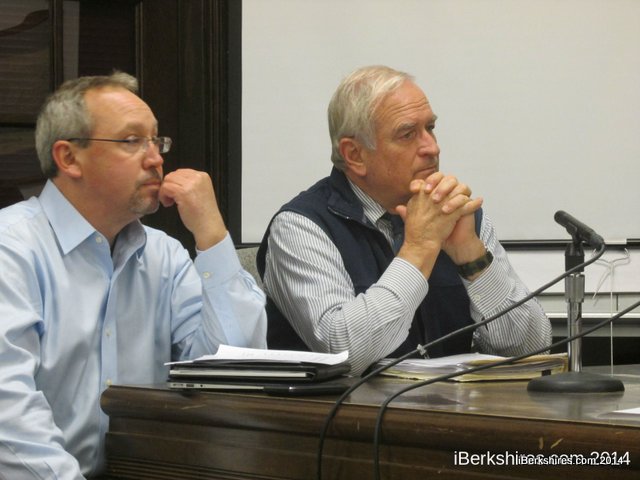 Community Preservation Committee members Jeffrey Thomas, left, and Philip McKnight broached the idea to the housing trust. Community Preservation Committee members Jeffrey Thomas, left, and Philip McKnight broached the idea to the housing trust. |
Town meeting created the Affordable Housing Trust in May 2012 and immediately added $200,000 to its coffers. Another $200,000 was added in May 2013, and the trust sought and was approved for $75,000 last year. Of that $475,000, the trust last December committed $150,000 to the Highland Woods senior housing project and a small sum to help the Affordable Housing Committee to study and remediate town-owned properties. That leaves about $320,000 in the Trust's account.
"Against that $320,000, we have an unknown number of Mortgage Assistance Program grants," Sheldon said.
"We don't know if Highland Woods, which we've supported to the tune of $150,000, might have another request for us. We don't know if the Photech (330 Cole Ave.) development might have some reason to ask us for money. We don't know whether we are going to, at some point, want to buy a piece of real estate, a piece of land.
"We have a bunch of unknowns at this point."
Sheldon reported to the trustees on Tuesday that an area bank told him an application for the trust's Mortgage Assistance Program is "in the pipeline." The program was created this summer to make up to $15,000 available for first-time homebuyers at or below Area Median Income, homebuyers who are moving to town after being displaced by job loss and former residents of the Spruces Mobile Home Park who were living in the park at the time of 2011's Tropical Storm Irene.
After its discussion with McKnight and Thomas on Tuesday, the trust board held a preliminary discussion about the availability of two properties — a vacant lot on Cole Avenue and a three-family residence on Maple Street. Sheldon said he would contact the director of the local Habitat for Humanity chapter to see if it was interested in partnering with the trust on the Cole Avenue site if it could be acquired.
Tags: affordable housing trust, bonding, Cable Mills, CPA,


